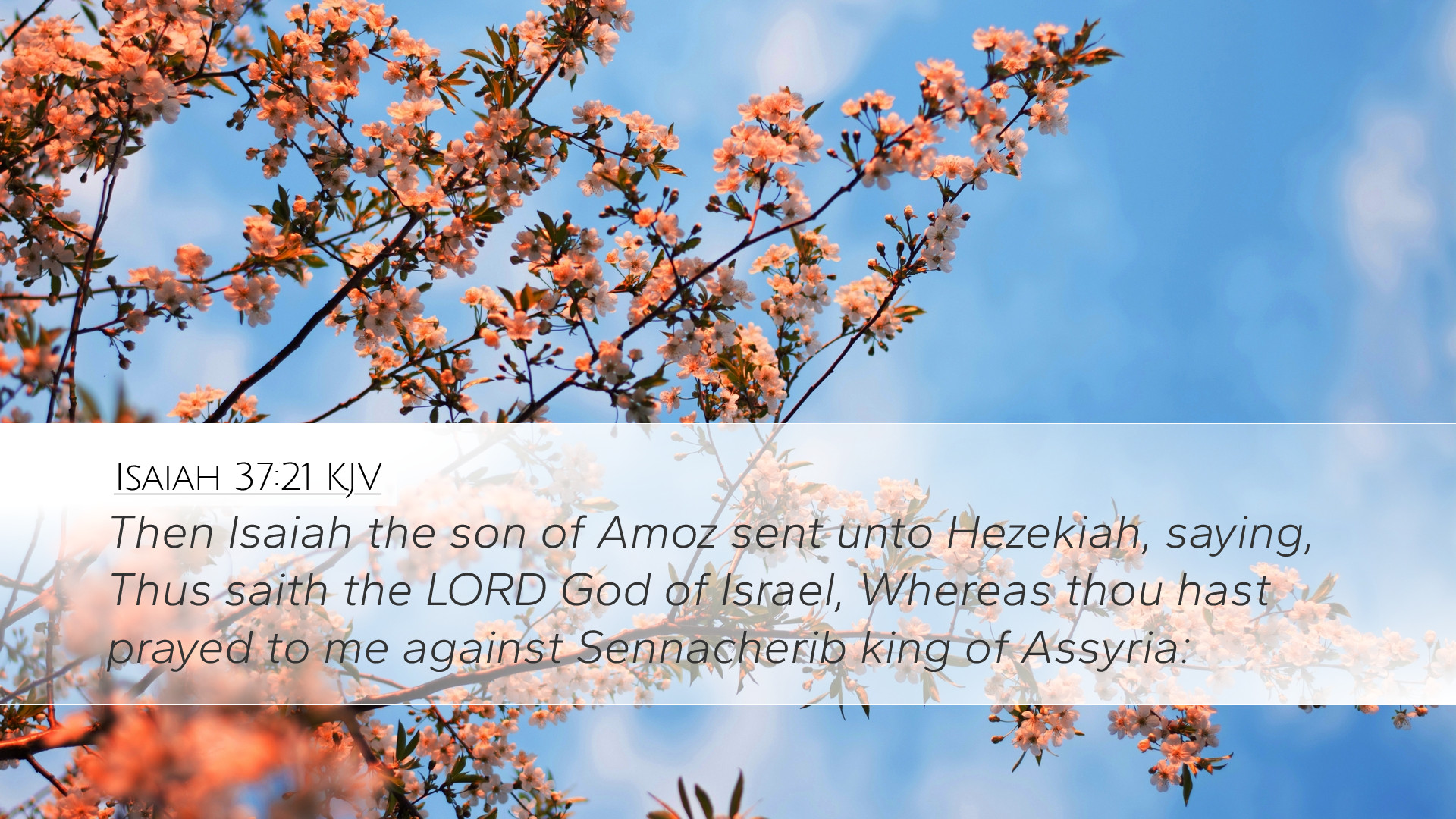Commentary on Isaiah 37:21
Isaiah 37:21 states:
"Then Isaiah the son of Amoz sent to Hezekiah, saying, Thus saith the Lord God of Israel, That which thou hast prayed to me against Sennacherib king of Assyria I have heard."
Contextual Overview
This verse is set in a significant historical context. King Hezekiah of Judah faced the imminent threat of Assyrian invasion under King Sennacherib. Hezekiah sought counsel from Isaiah, a prophet of God, showing a reliance on divine intervention in a time of national crisis.
Theological Insights
This passage emphasizes the theme of prayer and divine response, a prevalent motif in the scriptures. Here, we see how Hezekiah's earnest prayer brought a word of reassurance from God through the prophet Isaiah. This reflects God's readiness to hear and respond to the prayers of His people.
1. The Role of Prayer
Albert Barnes points out that the acknowledgment of being in dire straits leads to genuine prayer. Hezekiah's prayer serves as a model for believers today, demonstrating that prayer is not merely a formality but a serious approach to our struggles.
Furthermore, Adam Clarke notes that Hezekiah's prayer was characterized by sincerity and humility before God, emphasizing that true prayer involves recognizing one's dependence on divine help.
2. Divine Assurance
This verse reveals God's promise of assurance in response to Hezekiah’s plea. Matthew Henry elaborates on this by asserting that God’s response underscores His sovereignty and faithfulness. He will listen to the cries of His children and provide the support they need in times of trouble.
Also, the phrase, "I have heard," confirms that God is attentive to our supplications. His readiness to hear Hezekiah exemplifies the assurance believers can have that their prayers are not in vain.
3. The Nature of God's Communication
The communication from God through Isaiah signifies the importance of prophetic ministry. Barnes emphasizes that the prophet serves as a mediator, conveying God's will and assurance to His people. This indicates that the prophetic voice is vital in relaying God's messages, particularly during crises.
Historical Context
The context of Assyria’s military might and the psychological impact on Judah cannot be ignored. Henry notes that the Assyrian empire was a formidable power, and its threats were not idle. Understanding this backdrop enhances the weight of God's promise to Hezekiah.
Clarke also indicates that the fearful disposition of the people of Judah was palpable, and the assurance given through Isaiah served to bolster their faith in God's providence amidst perilous circumstances.
Applications for Today
The implications of Isaiah 37:21 resonate with contemporary believers. In an age marked by uncertainty, the assurance that God hears prayers can provide profound comfort.
1. Encouragement in Difficult Times
Just as Hezekiah found strength in Isaiah's words, modern believers can trust in the promises of God. Henry teaches that even in apparent hopelessness, a dedicated prayer life leads to divine intervention. This is an invitation for pastors and students of the Word to embrace prayer not as a last resort but as a first response.
2. Recognizing God’s Presence
Understanding that God is actively engaged in our lives encourages deeper faith. Barnes suggests that recognizing God's presence can transform our understanding of trials, showing that He is deeply invested in our situations.
3. The Importance of Prophetic Voices
In today’s context, the role of church leaders and theologians as communicators of God’s truth is critical. Clarke implies that they must carefully guide their communities, reflecting God’s assurance through sound teaching and prophetic insight.
Conclusion
Isaiah 37:21 is a powerful reminder of God’s caring engagement with His people in their struggles. The historical context of Hezekiah's plea and God’s faithful reply through the prophet Isaiah invites us to immerse ourselves in prayer, seek the prophetic voice, and trust in God's promise of intervention. As we face our own "Sennacheribs," may we find solace in the affirmation that God hears and responds to the heartfelt cries of His people.


